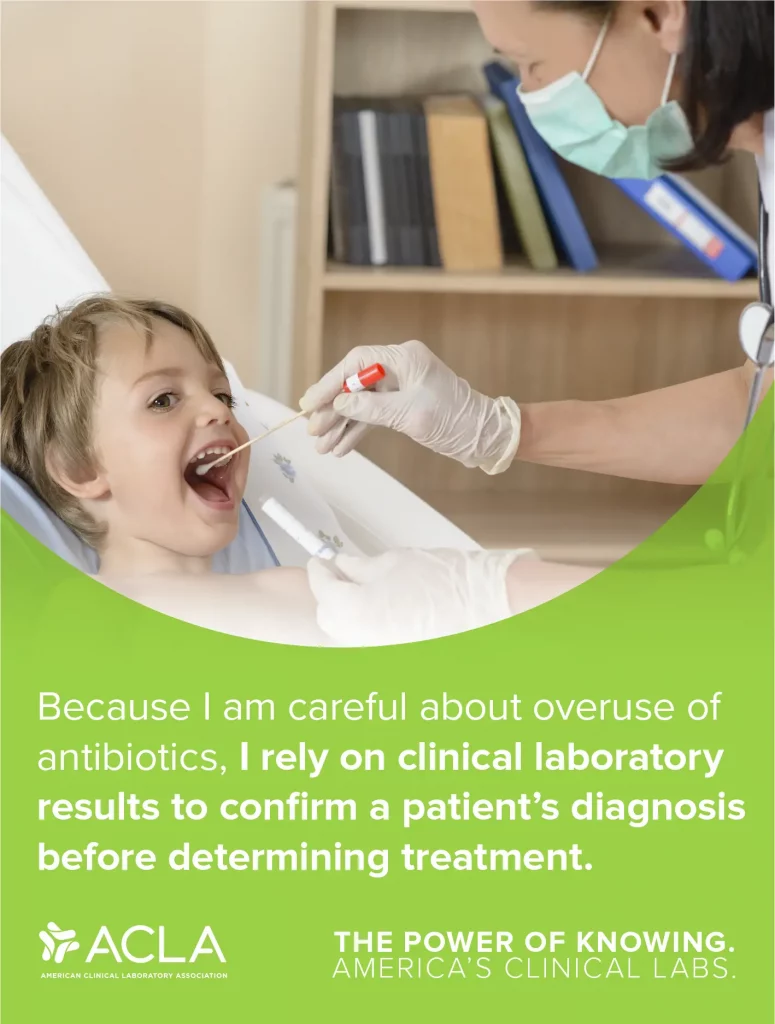

America’s clinical laboratories serve as the foundation for public health preparedness and response and for everyday prevention, diagnosis, and treatment of disease for patients across the country. From routine blood tests to ground-breaking genetic tests that guide therapy selection, clinical laboratories play a vital role in answering some of life’s most important questions.
For millions of Americans and their health providers, laboratory tests are the start of any comprehensive care plan, empowering patients with the answers they need to guide health care decisions. Results from laboratory tests inform 70 percent of clinical decision-making, helping patients monitor, diagnose, and treat common, chronic, and rare conditions every day, yet account for less than three percent of total health care spending. Effective use of screening and diagnostic tests allows patients to receive the right care at the right time while often reducing overall health care costs.
Laboratories’ investments in innovation are leading to extraordinary advancements, changing health care as we know it, improving and saving lives.
Protecting the value that clinical laboratory testing brings to patients every day and the investments in innovative diagnostic solutions requires a strong laboratory infrastructure. Click here to learn how you can join our efforts to Stop Lab Cuts.
ACLA is highlighting the crucial role clinical laboratory testing plays in diagnosing common and complex neurological conditions. This Alzheimer’s and Brain Health Month, learn how clinical laboratory tests are utilized to guide disease management and treatment for patients.
Biomarker testing performed by clinical laboratories uses a patient sample (tissue, blood, or other body fluid) to check for abnormal changes in certain genes, proteins, or other molecules that could indicate the presence of a disease or condition. This type of personalized medicine allows providers to tailor treatments to patients based on their unique genetic makeup, molecular profiles, and disease characteristics.
Clinical laboratories are committed to delivering innovative tests that help identify, diagnose, and treat disease, like rapid whole genome sequencing (rWGS). This genetic testing method can diagnose any one of thousands of genetic disorders in seven days or less. This makes it uniquely suited for diagnosing rare diseases, especially in infants.
ACLA is underscoring the vital role that clinical laboratories play in the identification and surveillance of antimicrobial resistance. This Antibiotic Awareness Week, learn how specialized clinical laboratory tests are utilized to guide disease management and treatment for patients.
Blog: Clinical Laboratories Empower Patients to Take Charge of Diabetes
November is American Diabetes Month, a chance to bring awareness to the fundamental role of clinical laboratories in diagnosing and managing this chronic, progressive health condition. Diabetes affects more than 37 million Americans, yet more than 20% people who have it are unaware… Read More
Blog: Clinical Laboratories Key To Breast Cancer Diagnosis And Treatment
In the United States, a woman’s average risk of developing breast cancer at some time during her life is about 13%, meaning women face a one in eight chance of developing the disease. October, National Breast Cancer Awareness Month, highlights the burden of this disease to increase patient knowledge and to highlight the critical importance of regular screenings to improve survival rates… Read More
Blog: Understanding the Role of Clinical Laboratories in Supporting Substance Abuse Recovery
Each September, National Recovery Month is an opportunity to highlight the vital role of clinical laboratories in the treatment and support of people in recovery from substance use disorders. Joan Kegerize, Vice President of Reimbursement and Scientific Affairs with the American Clinical Laboratory Association, offers insight on current issues affecting drug testing and clinical laboratories… Read More
Blog: Clinical Laboratories’ Role in Eradicating Cervical Cancer
Clinical laboratory services play a critical role in evaluating womens’ cervical health. The utilization of screening tools, made possible by the ever-advancing capabilities of clinical laboratories, helps diagnose about 13,000 new cases of cervical cancer annually and, just as importantly, helps identify risk factors for hundreds of thousands of women… Read More
Blog: Clinical Laboratory Tests: Essential Tools for Detecting and Managing Heart Disease
This American Heart Month, we are reminded of the vital role that clinical laboratory testing services play in the prevention, detection, and management of heart disease. … Read More
Blog: Clinical Laboratory Tests Offer Line of Defense Against Colorectal Cancer
America’s clinical laboratories play a critical role in the prevention and detection of colorectal cancer, as well as in the identification and monitoring of appropriate therapies. Colorectal cancer is the second deadliest cancer in the United States affecting both men and women … Read More
Blog: Clinical Laboratories’ Role in Informing Kidney Health
During March’s National Kidney Month, ACLA is highlighting the essential role that clinical laboratories serve in the diagnosis and management of kidney health. In the United States, diabetes and high blood pressure are the leading causes of kidney failure, accounting for three out of four new cases … Read More
Blog: Screening, Diagnosis and Treatment are Key to Addressing Nationwide Spike in STIs
April is Sexually Transmitted Infections (STI) Awareness Month, a time to encourage conversation and education around the importance of sexual health in promoting overall wellness. When undiagnosed and left untreated, STIs can lead to irreversible health outcomes … Read More
Blog: Clinical Laboratory Testing Crucial for Women Across Many Life Stages
May is Women’s Health Month – a perfect opportunity to focus on the value clinical laboratories bring to supporting women and their clinicians in evaluating and optimizing their overall health, including testing for diseases and conditions that either disproportionately or solely affect women … Read More
June is Men’s Health Month, an opportunity to focus on the many ways that recommended clinical laboratory testing is essential in assessing, addressing and managing men’s health. In what has been called a “silent health crisis,’’ research shows that, compared to women, men are less likely to see the doctor, and are at greater risk of death from a variety of health issues … Read More